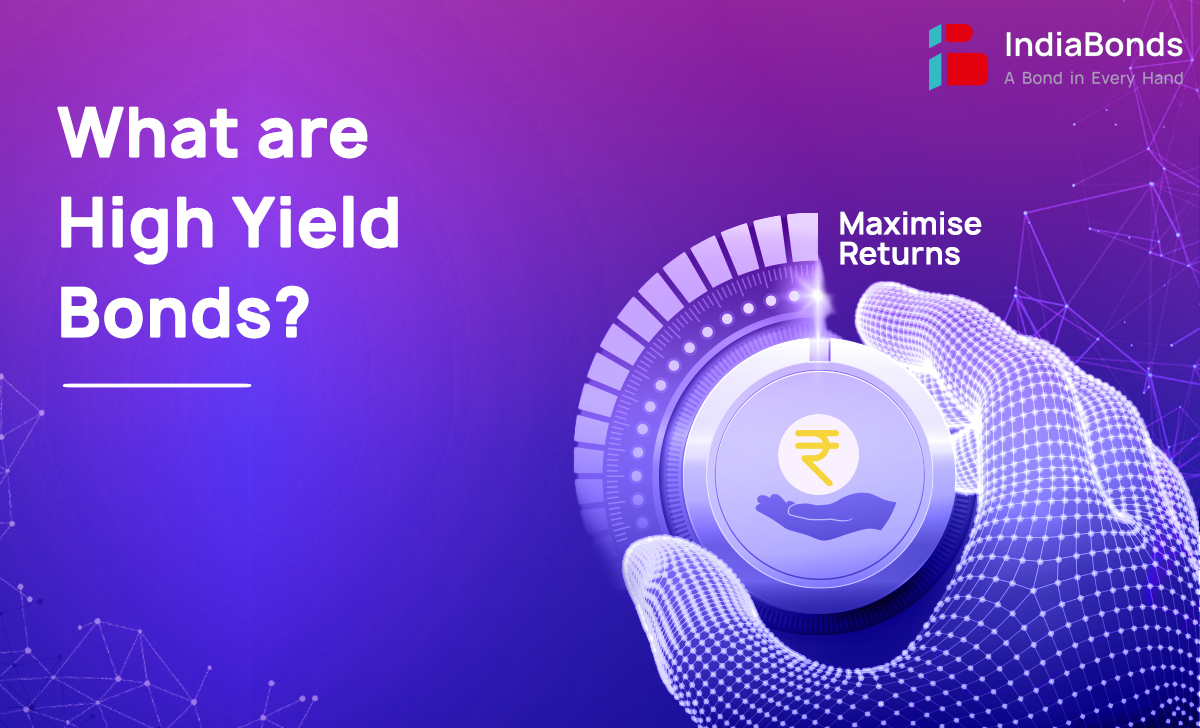What Are High-Yield Bonds?

Bonds are debt instruments where the issuing entities promise to pay the investor a specific amount of interest over the tenure of the bond and return the principal amount at the end of it.
In high yield bonds the interest rates are higher than other fixed income instruments with similar tenure. As the risk factor is high, so are the returns to compensate for the associated risks. That is why it is called a High-Yield bond.
The companies issuing high yield bonds are typically startups or organizations where credit rating agencies show caution in rating them. High yield bond investors are looking for higher interest rates which suit their risk appetite. There may be a situation where the organization that has issued a high yield bond starts doing well in due course of time, in which case the investment in those bonds can have potential gain. In spite of the higher risks associated with high yield bonds, they are actually way less risky than stocks! The investor gets higher fixed income than government and high-grade bonds but does not have to deal with the volatility of equities.
How do High Yield Bonds work?
Whenever we mention a high yield bond, the meaning or definition of a bond as a promissory note does not change. High yield bonds are identical to the traditional bonds that various companies issue. Like other bonds, the holder of high yield bonds is also entitled to a return on investment.
However, the fundamental difference lies in the area of the companies that are issuing these bonds. High Yield bonds give higher returns thereby compensating for the risk factor associated with it.




Why would investors buy a High Yield Bond?
An investor would invest in a high yield bond solely to earn more out of the investment. However, some investors have a significant risk appetite and are comfortable taking the risk, to earn higher interest. If you fall into that investor category, you are a candidate for high yield bonds.
High-yield bonds in your portfolio help boost the overall returns on your investment due to the high interest rate. While we may discuss the high-risk perceptions of a high yield bond, the definition of bonds as an instrument does not change. Moreover, bonds have a comparatively lower risk than stocks. Hence, you earn higher returns on your investments out of high yield bonds.
Some of the pros of buying a high yield bond are as follows:
- Higher yield: The interest rates on these bonds are higher than other fixed income instruments available in the market with similar tenure.
- Diversification of the portfolio: If you have a slightly larger risk appetite, high yield bonds make your investment portfolio more diverse, as putting all eggs in the same asset basket may be risky.
- Stocks are riskier: If the issuing company goes bankrupt, the holders of the bonds are always paid back. The same cannot be said for stockholders.
- Regular payments: Until the high yield bond matures, you are entitled to recurring payments at regular intervals.
- Liquidity: These bonds are easily tradable in secondary market.
How to buy High Yield Bonds?
As an investor keen to invest in high yield bonds to grow wealth at a faster rate, the following are the methods by which you may buy them:
Direct investment:
If you have the desired liquidity, you may directly invest in high yield bonds through IndiaBonds website. Investing in high yield bonds through the online platform provided by IndiaBonds is very convenient. All you need to do is sign up on www.indiabonds.com and complete your KYC in under 3 minutes. It’s paperless and requires no uploads. Once you confirm that the account has been created, you may start buying bonds through IndiaBonds.
Are High Yield Bonds a good investment?
High Yield bonds are an attractive investment option for a person having good appetite for risks. High-risk bonds give you a return at a much higher rate than other bonds. In addition, high yield bonds provide an impetus for growth and add diversification to your investment portfolio.
Apart from the perceived high yields, you will get attractive discounts for investing in companies that have not shown exciting results over the course. However, you are expected to conduct detailed fundamental research on the company issuing the bond. That will give you a fair idea of the company’s stock performance. If the company shares are doing fine, the future of the bonds is also safe.
Conclusion
As discussed above, high yield bonds will likely yield returns at a rate notches above the market. The presence of high yield bonds boosts your overall portfolio and compensates for the slow growth in some other asset classes. Be a prudent investor and ensure that your portfolio is well balanced and diversified. So while High Yield bonds carry with it a certain degree of risk, this asset class is not as risky or volatile as stocks!
Disclaimer: Investments in debt securities/ municipal debt securities/ securitised debt instruments are subject to risks including delay and/ or default in payment. Read all the offer related documents carefully.













































